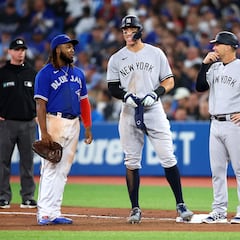Will the Atlanta Braves become the first team to never lay down a sacrifice bunt?
The reigning World Series champion Atlanta Braves are eight games away from making baseball history, laying bare the baseball-vs-analytics battle


No team has ever completed a full 162-game MLB season without laying down a sacrifice bunt.
What? Say that again.
No team has ever completed a full 162-game MLB season without laying down a sacrifice bunt.
The Atlanta Braves are now just eight games away from making baseball history by becoming the first team to never lay down a sacrifice bunt.
This may seem like a side note, something that has no real bearing on baseball other than as an asterisk in future almanacs, and perhaps it is. But there is a serious point to be made here on what this represents.
The problem with the bunt
A bunt is the simplest of actions, and the most polemic of plays in baseball. Traditionalists will tout the bunt as good strategy. Trading a likely out to get a runner into scoring position is simply good baseball. But in the analytics-driven tactics of the last two decades, bunting has come to be seen as a bad trade-off.
In their ever-increasing efforts to boil baseball down to a single formula, sabermetricians have placed a mathematical value on outs that is higher than the value of a runner’s base placement. In looking at teams between 1993 and 2010, a runner on first with no outs would have a .941 scoring average, whereas a runner on second with one out is a .721 scoring average.
Traditionalists will argue that this ignores the chaotic nature of putting the ball in play, where anything could happen. Arguing that baseball has been played very successfully for well over a century and a half utilising the same basic tactics, that studying the likelihood is all very well, but sometimes you need to get that runner onto second more than you need that out in your back pocket.
The Atlanta Braves
Brian Snitker is a risk-taker, a maverick, not known for playing the numbers. On the face of it, you would think that he would be exactly the kind of manager who would lay down a bunt from time to time. But when it comes to bunting, he comes down on the side of the sabermetricians. He hates it.
In previous seasons, Snitker would have the Braves lay down the occasional bunt, often only one or two per season, and always when the pitcher was up to bat early in an inning. The universal designated hitter has now removed the one circumstance in which the Atlanta skipper would conceivably tolerate the anachronistic tactic.
Going into the playoffs, Atlanta will have to get through the Dodgers if they want to repeat, there is no going around them. But with a similar style of play, with formidable offense and a deep bullpen, bunting, and more generally the mindset that produces bunting, is not likely to be an issue. But once they get to the Fall Classic, that may flip on its head.
Twice as many Runs as RBI
— OldTimeHardball (@OleTimeHardball) September 25, 2022
Brett Butler - 1359 Runs and 578 RBI pic.twitter.com/XBQCu63WzG
Related stories
With the Houston Astros registering back-to-back bunts-for-hits back in July, and likely to be headed to the World Series on the AL side of the bracket, assuming that they can get past the Yankees, the Braves will have to square off with a team who are squarely in the “traditionalist” corner, eking out runs any way that they can. Dusty Baker is the antithesis of Brian Snitker, a manager who cares not a jot about exit velocity or launch angle or WAR or any other stat that doesn’t have a beating pulse. “We’re not looking for some exit speed. We’re looking for some exit hits!”
Brian Snitker may surprise us. He may find the situation demanding that he dial up the sacrifice bunt in the next eight games. But it would not be wise to hold your breath. Brian Snitker hates bunting, and it looks as if the Braves are about to set a new baseball record, however damp that squib may be.

